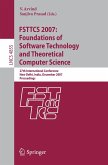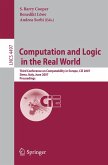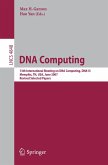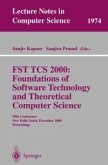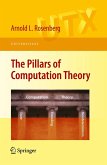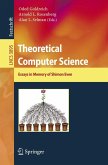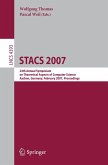S. D. Brookes, M. Donner, J. Driscoll, M. Mauldin, R. Pausch, W. L. Scherlis, Mary Shaw, A. Z. Spector
The Carnegie-Mellon Curriculum for Undergraduate Computer Science (eBook, PDF)
Redaktion: Shaw, Mary
40,95 €
40,95 €
inkl. MwSt.
Sofort per Download lieferbar

20 °P sammeln
40,95 €
Als Download kaufen

40,95 €
inkl. MwSt.
Sofort per Download lieferbar

20 °P sammeln
Jetzt verschenken
Alle Infos zum eBook verschenken
40,95 €
inkl. MwSt.
Sofort per Download lieferbar
Alle Infos zum eBook verschenken

20 °P sammeln
S. D. Brookes, M. Donner, J. Driscoll, M. Mauldin, R. Pausch, W. L. Scherlis, Mary Shaw, A. Z. Spector
The Carnegie-Mellon Curriculum for Undergraduate Computer Science (eBook, PDF)
Redaktion: Shaw, Mary
- Format: PDF
- Merkliste
- Auf die Merkliste
- Bewerten Bewerten
- Teilen
- Produkt teilen
- Produkterinnerung
- Produkterinnerung

Bitte loggen Sie sich zunächst in Ihr Kundenkonto ein oder registrieren Sie sich bei
bücher.de, um das eBook-Abo tolino select nutzen zu können.
Hier können Sie sich einloggen
Hier können Sie sich einloggen
Sie sind bereits eingeloggt. Klicken Sie auf 2. tolino select Abo, um fortzufahren.

Bitte loggen Sie sich zunächst in Ihr Kundenkonto ein oder registrieren Sie sich bei bücher.de, um das eBook-Abo tolino select nutzen zu können.
This curriculum and its description were developed during the period 1981 - 1984
- Geräte: PC
- ohne Kopierschutz
- eBook Hilfe
- Größe: 16.05MB
Andere Kunden interessierten sich auch für
![FSTTCS 2007: Foundations of Software Technology and Theoretical Computer Science (eBook, PDF) FSTTCS 2007: Foundations of Software Technology and Theoretical Computer Science (eBook, PDF)]() FSTTCS 2007: Foundations of Software Technology and Theoretical Computer Science (eBook, PDF)40,95 €
FSTTCS 2007: Foundations of Software Technology and Theoretical Computer Science (eBook, PDF)40,95 €![Computation and Logic in the Real World (eBook, PDF) Computation and Logic in the Real World (eBook, PDF)]() Computation and Logic in the Real World (eBook, PDF)73,95 €
Computation and Logic in the Real World (eBook, PDF)73,95 €![DNA Computing (eBook, PDF) DNA Computing (eBook, PDF)]() DNA Computing (eBook, PDF)40,95 €
DNA Computing (eBook, PDF)40,95 €![FST TCS 2000: Foundations of Software Technology and Theoretical Science (eBook, PDF) FST TCS 2000: Foundations of Software Technology and Theoretical Science (eBook, PDF)]() FST TCS 2000: Foundations of Software Technology and Theoretical Science (eBook, PDF)40,95 €
FST TCS 2000: Foundations of Software Technology and Theoretical Science (eBook, PDF)40,95 €![The Pillars of Computation Theory (eBook, PDF) The Pillars of Computation Theory (eBook, PDF)]() Arnold L. RosenbergThe Pillars of Computation Theory (eBook, PDF)40,95 €
Arnold L. RosenbergThe Pillars of Computation Theory (eBook, PDF)40,95 €![Theoretical Computer Science (eBook, PDF) Theoretical Computer Science (eBook, PDF)]() Theoretical Computer Science (eBook, PDF)40,95 €
Theoretical Computer Science (eBook, PDF)40,95 €![STACS 2007 (eBook, PDF) STACS 2007 (eBook, PDF)]() STACS 2007 (eBook, PDF)73,95 €
STACS 2007 (eBook, PDF)73,95 €-
-
-
This curriculum and its description were developed during the period 1981 - 1984
Dieser Download kann aus rechtlichen Gründen nur mit Rechnungsadresse in A, B, BG, CY, CZ, D, DK, EW, E, FIN, F, GR, HR, H, IRL, I, LT, L, LR, M, NL, PL, P, R, S, SLO, SK ausgeliefert werden.
Produktdetails
- Produktdetails
- Verlag: Springer New York
- Seitenzahl: 198
- Erscheinungstermin: 6. Dezember 2012
- Englisch
- ISBN-13: 9781461250807
- Artikelnr.: 43992423
- Verlag: Springer New York
- Seitenzahl: 198
- Erscheinungstermin: 6. Dezember 2012
- Englisch
- ISBN-13: 9781461250807
- Artikelnr.: 43992423
- Herstellerkennzeichnung Die Herstellerinformationen sind derzeit nicht verfügbar.
1. Introduction and Overview.- 1.1 Goals of the Curriculum Design.- 1.2. Educational Philosophy.- 1.3. Character of the Curriculum.- 1.4. Innovations in the Curriculum.- 1.5. Organization of the Book.- 2. The Nature of Computer Science.- 2.1. Working Definition of Computer Science.- 2.2. A View of Future Computing.- 3. Roles for Universities.- 3.1. The Audience.- 3.2. Use of Computing Technology in Education.- 3.3. The ACM and IEEE Curricula.- 4. Objectives for the Curriculum.- 4.1. Premises.- 4.2. Goals.- 5. The Content of Computer Science.- 5.1. Basics.- 5.2. Elementary Computer Science.- 5.3. Liberal Professional Education.- 5.4. Advanced Computer Science.- 6. Program Organization.- 6.1. Requirements.- 6.2. Advice on the Use of Electives.- 6.3. Program Flexibility.- 6.4. Sample Program.- 7. Curriculum'78-Is Computer Science Really that Unmathematical?.- 7.1. Curriculum '78 and Mathematics.- 7.2. Mathematics for Computer Scientists.- 8. Mathematics Curriculum and the Needs of Computer Science.- 8.1. Some Words about Computer Science.- 8.2. Mathematical Aspects of Undergraduate Computer Science.- 8.3. Some Remarks about Computer Science and Mathematics Curricula.- 8.4. Conclusion.- 9. Theory and Practice in the Fundamental Computer Science Course.- 9.1. Introduction.- 9.2. Course Overview.- 9.3. Major topics in the Fundamental Structures Course.- 9.4. Experiences.- 9.5. Conclusions.- 10. Remarks on the Design.- 10.1. General Philosophy.- 10.2. Relation to Traditional Courses.- 10.3. Course Organization and Style.- 10.4. Course Numbering Scheme.- 11. Course Descriptions.- 11.1. Basic and Introductory Courses.- 11.2. Elementary and Intermediate Computer Science Courses.- 11.3. Advanced Computer Science Courses.- 12. Related Courses.- 12.1. Mathematics Courses.-12.2. Statistics Courses.- 12.3. Electrical Engineering Courses.- 12.4. Psychology Courses.- 12.5. Engineering and Public Policy Courses.- 12.6. Engineering Courses.
1. Introduction and Overview.- 1.1 Goals of the Curriculum Design.- 1.2. Educational Philosophy.- 1.3. Character of the Curriculum.- 1.4. Innovations in the Curriculum.- 1.5. Organization of the Book.- 2. The Nature of Computer Science.- 2.1. Working Definition of Computer Science.- 2.2. A View of Future Computing.- 3. Roles for Universities.- 3.1. The Audience.- 3.2. Use of Computing Technology in Education.- 3.3. The ACM and IEEE Curricula.- 4. Objectives for the Curriculum.- 4.1. Premises.- 4.2. Goals.- 5. The Content of Computer Science.- 5.1. Basics.- 5.2. Elementary Computer Science.- 5.3. Liberal Professional Education.- 5.4. Advanced Computer Science.- 6. Program Organization.- 6.1. Requirements.- 6.2. Advice on the Use of Electives.- 6.3. Program Flexibility.- 6.4. Sample Program.- 7. Curriculum'78-Is Computer Science Really that Unmathematical?.- 7.1. Curriculum '78 and Mathematics.- 7.2. Mathematics for Computer Scientists.- 8. Mathematics Curriculum and the Needs of Computer Science.- 8.1. Some Words about Computer Science.- 8.2. Mathematical Aspects of Undergraduate Computer Science.- 8.3. Some Remarks about Computer Science and Mathematics Curricula.- 8.4. Conclusion.- 9. Theory and Practice in the Fundamental Computer Science Course.- 9.1. Introduction.- 9.2. Course Overview.- 9.3. Major topics in the Fundamental Structures Course.- 9.4. Experiences.- 9.5. Conclusions.- 10. Remarks on the Design.- 10.1. General Philosophy.- 10.2. Relation to Traditional Courses.- 10.3. Course Organization and Style.- 10.4. Course Numbering Scheme.- 11. Course Descriptions.- 11.1. Basic and Introductory Courses.- 11.2. Elementary and Intermediate Computer Science Courses.- 11.3. Advanced Computer Science Courses.- 12. Related Courses.- 12.1. Mathematics Courses.-12.2. Statistics Courses.- 12.3. Electrical Engineering Courses.- 12.4. Psychology Courses.- 12.5. Engineering and Public Policy Courses.- 12.6. Engineering Courses.

